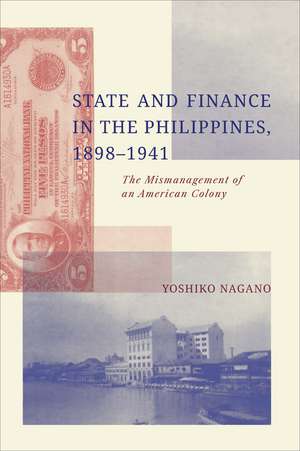State and Finance in the Philippines, 1898-1941: The Mismanagement of an American Colony
Autor Yoshiko Naganoen Limba Engleză Paperback – 12 apr 2015
During the First World War, ill-advised steps by colonial officials in the Philippines who were responsible for the colony's finances created a crisis which lasted from 1919 until 1922. The circumstances shook the foundations of the American colonial state and contributed to Manuel L. Quezon’s successful effort to replace Sergio Osmeña as leader of the politically dominant Nacionalista Party. These events have generally been blamed on a corruption scandal at the Philippine National Bank, which had been established in 1916 as a multi-purpose, semi-governmental agency whose purpose was to provide loans for the agricultural export industry, to do business as a commercial bank, to issue bank notes, and to serve as a depository for government funds.
Based on detailed archival research, Yoshiko Nagano argues that the crisis in fact resulted from mismanagement of currency reserves and irregularities in foreign exchange operations by American officials, and that the notions of a "corruption scandal" arose from a colonial discourse that masked problems within the banking and currency systems and the U.S. colonial administration. Her analysis of this episode provides a fresh perspective on the political economy of the Philippines under American rule, and suggests a need for further scrutiny of historical accounts written on the basis of reports by colonial officials.
Based on detailed archival research, Yoshiko Nagano argues that the crisis in fact resulted from mismanagement of currency reserves and irregularities in foreign exchange operations by American officials, and that the notions of a "corruption scandal" arose from a colonial discourse that masked problems within the banking and currency systems and the U.S. colonial administration. Her analysis of this episode provides a fresh perspective on the political economy of the Philippines under American rule, and suggests a need for further scrutiny of historical accounts written on the basis of reports by colonial officials.
Preț: 251.00 lei
Nou
Puncte Express: 377
Preț estimativ în valută:
48.03€ • 49.63$ • 39.96£
48.03€ • 49.63$ • 39.96£
Carte disponibilă
Livrare economică 26 februarie-12 martie
Livrare express 12-18 februarie pentru 30.15 lei
Preluare comenzi: 021 569.72.76
Specificații
ISBN-13: 9789971698416
ISBN-10: 9971698412
Pagini: 272
Dimensiuni: 152 x 229 x 18 mm
Greutate: 0.53 kg
Editura: Nus Press Pte Ltd
Colecția National University of Singapore Press
ISBN-10: 9971698412
Pagini: 272
Dimensiuni: 152 x 229 x 18 mm
Greutate: 0.53 kg
Editura: Nus Press Pte Ltd
Colecția National University of Singapore Press
Cuprins
Map and Illustrations
Figures and Tables
Preface and Acknowledgments
INTRODUCTION: Understanding the Philippine Financial Crisis, 1919-1922
PART I. OVERVIEW
CHAPTER 1: The Philippine Currency System under U.S. Rule
CHAPTER 2: The Emergence of Modern Banking in the Philippines
PART II. START-UP
CHAPTER 3: The Agricultural Bank of the Philippine Government
CHAPTER 4: The Philippine National Bank and Lending in Agriculture
PART III. DEBACLE
CHAPTER 5: The Wood-Forbes Mission and the Financial Crisis
CHAPTER 6: The Philippine National Bank and Credit Inflation
CHAPTER 7: Reconstructing the Philippine National Bank and the Currency System
Conclusion
Notes
Bibliography
Index
Figures and Tables
Preface and Acknowledgments
INTRODUCTION: Understanding the Philippine Financial Crisis, 1919-1922
PART I. OVERVIEW
CHAPTER 1: The Philippine Currency System under U.S. Rule
CHAPTER 2: The Emergence of Modern Banking in the Philippines
PART II. START-UP
CHAPTER 3: The Agricultural Bank of the Philippine Government
CHAPTER 4: The Philippine National Bank and Lending in Agriculture
PART III. DEBACLE
CHAPTER 5: The Wood-Forbes Mission and the Financial Crisis
CHAPTER 6: The Philippine National Bank and Credit Inflation
CHAPTER 7: Reconstructing the Philippine National Bank and the Currency System
Conclusion
Notes
Bibliography
Index
